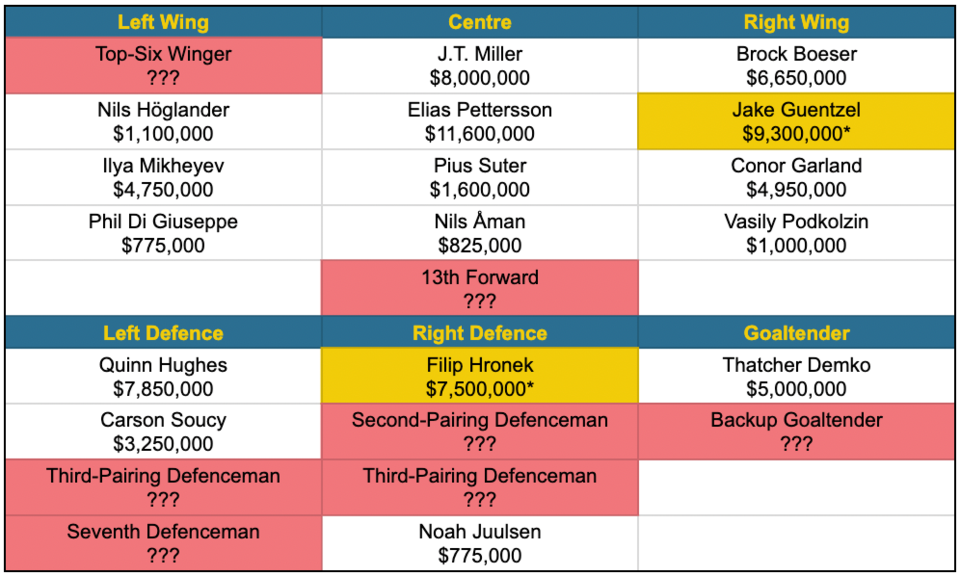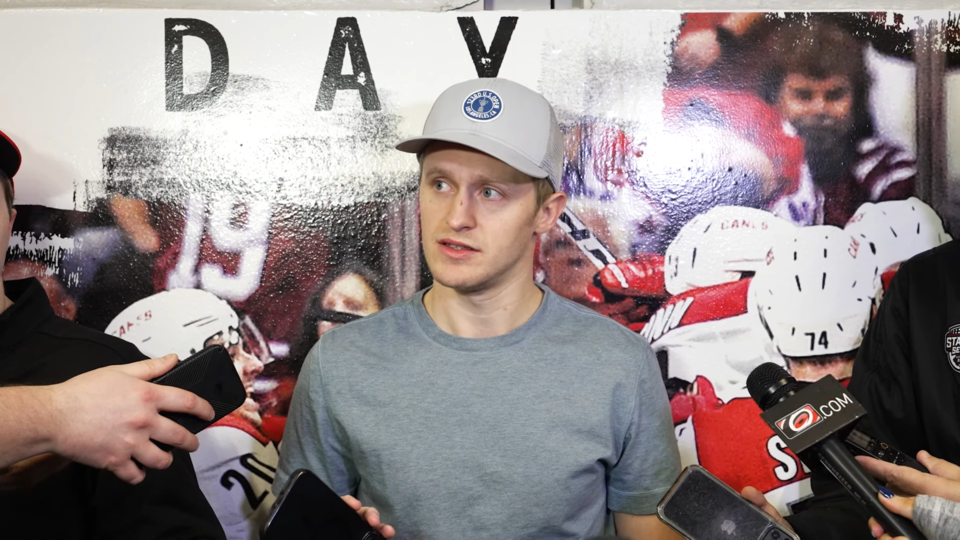The Â鶹´«Ã½Ó³»Canucks came agonizingly close to beating the Edmonton Oilers in the second round of the Stanley Cup Playoffs and now the Oilers are in the Stanley Cup Final.
That has caused all sorts of consternation for Canucks head coach Rick Tocchet, who had to admit that he’s been second-guessing himself as he’s watched the playoffs progress.
“Could I have done something different? Should we have skated maybe one of those days we didn’t?” said Tocchet. “You have to be careful. I find myself playing the what if game. I’ve tried to watch the last few games, not the ‘what if’ and just trying to enjoy the game. It’s hard.”
Canucks need to add a top-six winger in the offseason
It seems likely that similar thoughts plague general manager Patrik Allvin, who was blunt about being unhappy with how the season ended. One of those things that Allvin could have done differently is done more to acquire a top-six winger to play with Elias Pettersson. Instead, Pettersson was stuck with the snakebitten Ilya Mikheyev, who had just one goal and 14 points in his final 61 games, including the playoffs.
“It wasn’t [Mikheyev's] fault that he was put in a top-six position; it was my fault,” said Allvin, adding, “My job is to put players in a position where they belong for them to be successful.”
At one point, it seemed like the Canucks had too many wingers and not enough centres but trading away Tanner Pearson, Anthony Beauvillier, and Andrei Kuzmenko — not to mention sticking Vasily Podkolzin in the AHL for the bulk of the season — erased that winger depth. It’s not that those were bad moves but it left the Canucks with not enough wingers to go around.
Adding a bonafide top-six winger this offseason has to be a priority for the Canucks.
The question is, just how high will the Canucks aim? Could the Canucks spend big on one of the top-tier free agents, spend a little less on a player in the second tier, or try to strike gold on the cheap?
Jake Guentzel's signing rights are available
One of the biggest names available is Jake Guentzel, who has a history with the Canucks’ president of hockey operations Jim Rutherford. While Rutherford wasn’t general manager of the Pittsburgh Penguins when they drafted Guentzel in 2013, he was the one who signed him to his entry-level contract in 2016, then re-signed him to his current, expiring contract in 2019.
Along the way, Guentzel helped Rutherford and the Penguins win the Stanley Cup in 2017, with the then-rookie leading the playoffs in goalscoring.
The Canucks were looking to trade for Guentzel at the trade deadline this year — one of many teams pursuing the winger — but couldn't come up with the assets to get a deal done. Could they acquire him now?
Guentzel is a high-end talent with two 40-goal seasons who has proven that he can play with elite talent, partnering with Sidney Crosby in Pittsburgh for most of his career and then with Sebastian Aho after a trade to the Carolina Hurricanes this past season. It’s easy to imagine him meshing well with Pettersson at even strength and finding a home at the net front or in the bumper on the power play.
But the Canucks won’t be the only team taking aim at Guentzel and the winger won’t be cheap.
With that in mind, should the Canucks try to jump the queue to negotiate with Guentzel ahead of free agency?
On an episode of his , Sportsnet’s Elliotte Friedman reported that the Hurricanes are looking to trade Guentzel’s rights before July 1 when free agency opens.
"It sounds like he's available for a mid-round pick," said Friedman. "I believe Carolina has let everyone know that if you want to trade for his rights and a chance to sign him, that it's possible for a mid-round pick."
Trading for Guentzel’s rights would give the Canucks two advantages. First of all, it would give them an exclusive negotiating window where they would be the only team vying for Guentzel’s services. Secondly, it would give them the option of signing Guentzel for eight years — the maximum contract length for re-signing with your current team — as opposed to seven years.
Ed. Note/Correction: A team can only sign a player for eight years if they were on that team's reserve list as of the previous season's trade deadline. The only way for the Canucks to sign Guentzel for eight years would be a sign-and-trade deal where the Hurricanes sign Guentzel to an eight-year deal and immediately trade him. Understandably, that would cost more than just a mid-round pick.
Is that worth a mid-round pick, perhaps in the fourth round?
It’s a risk because there are no guarantees that Guentzel would actually sign with the Canucks after this hypothetical trade but it’s not the most painful risk to take. While the Canucks don’t have a lot of picks in the 2024 draft, fourth-round picks seldom become NHL players.
In the last 30 years, just two Canucks fourth-round picks have played NHL games: Jack Rathbone and Joseph LaBate. In the entire , just four fourth-round picks have played more than 200 games: Ronnie Stern, Brad Smith, Murray Bannerman, and Harold Snepsts.
In other words, trading that kind of pick isn’t that big of a risk. The bigger question is if Guentzel is the right player for the Canucks to pursue.
What top-six forwards are available in free agency?
Guentzel is one of a couple of big-name forwards in free agency. Not all of those big names are guaranteed to be available — it’s hard to believe that Steve Stamkos will leave the Tampa Bay Lightning — but a few will hit free agency.
Here are the 22 unrestricted free agent (UFA) forwards who scored at least 40 points last season (and haven’t announced their retirement).
Sam Reinhart, with his 57 goals in the regular season and strong playoff performance for the potentially Cup-bound Florida Panthers, is in line for a huge payday in free agency, with projecting an $11.3 million cap hit on a max-term deal.
That’s out of the Canucks’ range but Guentzel isn’t projected to be much cheaper, expected to sign at around $9.3 million.
Can the Canucks afford that? Well, yes. They have the cap space available. The issue is that spending that much on Guentzel would force them to cut corners elsewhere in the lineup.
Let's look at this hypothetical: assume the Canucks re-sign Filip Hronek at $7.5 million and sign Guentzel at the project $9.3 million cap hit. That would give the Canucks a 16-man roster with a total cap hit of $77,271,667, leaving $10,728,333 in cap space with seven more players to sign or call up to make a 23-man roster.

It’s certainly possible to fill out the rest of the roster with that little cap space but it essentially guarantees that the Canucks wouldn’t be able to re-sign Elias Lindholm, Nikita Zadorov, or Dakota Joshua — at least not without drastic measures to free up cap space, such as spending further assets to dump Ilya Mikheyev’s contract.
It also means limited funds to upgrade the Canucks’ blue line, forcing them to hunt for bargains.
But maybe all three of those players were going to leave in free agency anyway. Maybe adding a player as good as Guentzel would be worth cutting corners elsewhere in the lineup.
There are other options, though.
What forwards could the Canucks sign aside from Guentzel?
Among the second tier of free agent forwards, Tyler Toffoli’s name jumps out. He has previous chemistry with both Pettersson and J.T. Miller and a knack for scoring goals. At a projected $6 million cap hit, Toffoli would upgrade the team’s top-six while leaving a little bit of wiggle room to upgrade the rest of the roster. Keep in mind, he just turned 32 and wasn’t the fastest skater to begin with.
If Teuvo Teräväinen leaves the Hurricanes, he’d be an intriguing option with his strong two-way game and playmaking acumen. He did just have a career-high in shooting percentage, though — his career shooting percentage is 10.7% but he had a 17.6% last season to score 25 goals. He may not be the finisher that Pettersson needs.
Then there’s Jonathan Marchessault, who had 42 goals last season. He’s a fantastic finisher but he’ll also turn 34 next season and you have to wonder if his playoff history — he won the Conn Smythe in 2023 — will up his asking price.
The question for the Canucks is whether to take one of these secondary options, hunt in the bargain bin, or take a big swing on Guentzel.
Let’s also keep in mind, as we consider the age of some of the other options, that Guentzel will turn 30 in October. An eight-year contract for Guentzel will take him until he’s 37 — will the first few years of $9+ million contract be worth it if his play significantly declines in the latter years of the contract?
That’s yet another question that Allvin has to consider as he looks to build the Canucks into a Stanley Cup winner.


